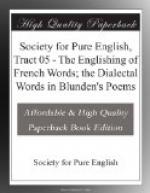Mark Twain once remarked that ’everybody talks about the weather and nobody does anything about it’. And many people think that we might as well hope to direct the course of the winds as to order the evolution of our speech. Some words have proved intractable. In the course of the past two centuries and a half, scores and even hundreds of French words have domiciled themselves in English without relinquishing their French characteristics. Consider the sad case of elite (which Byron used a hundred years ago), of encore (which Steele used two hundred years ago) of parvenu (which Gifford used in 1802), of ennui (which Evelyn used in 1667), and of nuance (which Walpole used in 1781).
No one hesitates to accept these words and to employ them frequently. Ennui and nuance are two words which cannot well be spared, but which we are unable to reproduce in our native vocalization. Their French pronunciation is out of the question. What can be done? Can anything be done? We may at least look the facts in the face and govern our own individual conduct by the results of this scrutiny. There is no reason why we should not accept what is a fact; and it is a fact that ennui has been adopted. So long ago as 1805 Sidney Smith used it as a verb and said that he had been ennuied. Why not therefore frankly and boldly pronounce it as English—ennwee? Why not forswear French again and pronounce nuance without trying vainly to preserve the Gallic nasality of the second n—newance? And as for a third necessary word, timbre. I can only register here my complete concurrence with the opinion expressed in Tract No. 3 of the Society for Pure English—that the ’English form of the French sound of the word would be approximately tamber; and this would be not only a good English-sounding word, like amber and chamber, but would be like our tambour, which is tympanum, which again is timbre’.
Why should not seance (which was used by Charles Lamb in 1803) drop its French accent and take an English pronunciation—see-ance? Why should not garage and barrage rhyme easily with marriage? Marriage itself came to us from the French; and it sets a good example to these two latest importations. Logic would suggest this, of course; but then logic does not always guide our linguistic practices. And here, again, I am glad to accept another suggestion which I find in Tract No. 3, that naivety be recognized and pronounced as an English word, and that ’a useful word like malaise could with advantage reassume the old form “malease” which it once possessed’.




